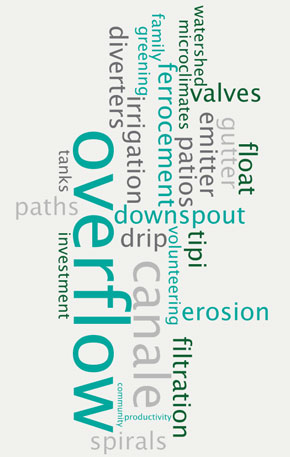The PermaDesign Weblog, with Nate Downey and Melissa McDonald!
The Reign of Rain
I'd be interested to hear feedback with respect to my underlying thesis (viz., water harvesting should be an important part of any recovering economy that also happens to have water-oriented challenges) found in this month's "Permaculture in Practice" column in the 'New Mexican.'
Water has always meant business, and its control affects the course of history. Sumer employed water-project profits to build Earth’s first civilization. Aristotle urged Greeks to “to construct great and ample receptacles for rain water.” The Romans maintained an extensive hydrological infrastructure, but in A.D. 537, the Ostrogothic army successfully finished off the city (and its empire) by obstructing aqueducts.
Today, much of the world faces significant water challenges. For people with entrepreneurial instincts, this means opportunity. Water harvesting provides a perfect storm of economic activity in which a vital and relatively clean resource is easily tapped. This previously neglected supply not only allows for other water sources to be used, but it can also allow for the development of real estate where conventional water is scarce.
Since water is the critical resource for life and for healthy economies, water harvesting’s ability to provide more water should not be underestimated. Economically, this is just the beginning. Rain capture reduces sediment carried by stormwater and thereby improves surface-water and groundwater quality. Reduced sediment levels also mean less soil erosion, which positively affects agriculture, property values, outside investment, tourism dollars and a community’s quality of life.
But that’s not all. The industry seems destined to become an engine of economic activity. Given the sheer number of roofs without cisterns, a water-harvesting revolution would fulfill our current need to create skilled and purposeful green jobs. What’s even better is that the jobs associated with the collection, conveyance, filtration, storage and distribution of roof water are jobs that are relatively hard to ship overseas. Plus, a cistern-system construction job is a local job, which translates into sales at regional hardware stores, garden centers and construction-supply outlets (as well as any place with to-go burritos).
Most important, however, is that cistern systems create manufacturing jobs. Although some tanks can be economically shipped, it is often not cost-effective to transport large, heavy, empty containers across oceans and continents, especially when seemingly minor damage can cause leaks later. This creates a need for local fabrication of cisterns.
Local manufacturing jobs are particularly important for economies at every level. Looking back at the modern history of recessions in the United States, increases in manufacturing (as a percentage of employment) often go hand in hand with economic recoveries. The one main exception is that after the 9/11 terrorist attacks, manufacturing employment continued its overall decline since World War II.
After cisterns have been designed, manufactured, and installed, this work creates a job-creation multiplier. Who will maintain the landscapes that exist because additional water is available? Who will clean, fix and replace filters to ensure the safety of potable water? Who will invent, inspect, finance and sell/market these systems? Who will sell the real estate that has increased in value? Many of these jobs will be local, and all of them constitute worthy employment.
With cheap energy, easy well-drilling and large-dam building on the wane, the water-harvesting era will inspire for job creators, elected officials, community planners, educators, scientists and peace activists. Let’s call it the reign of rain.
10/14/2014 | (0) Comments










Comments